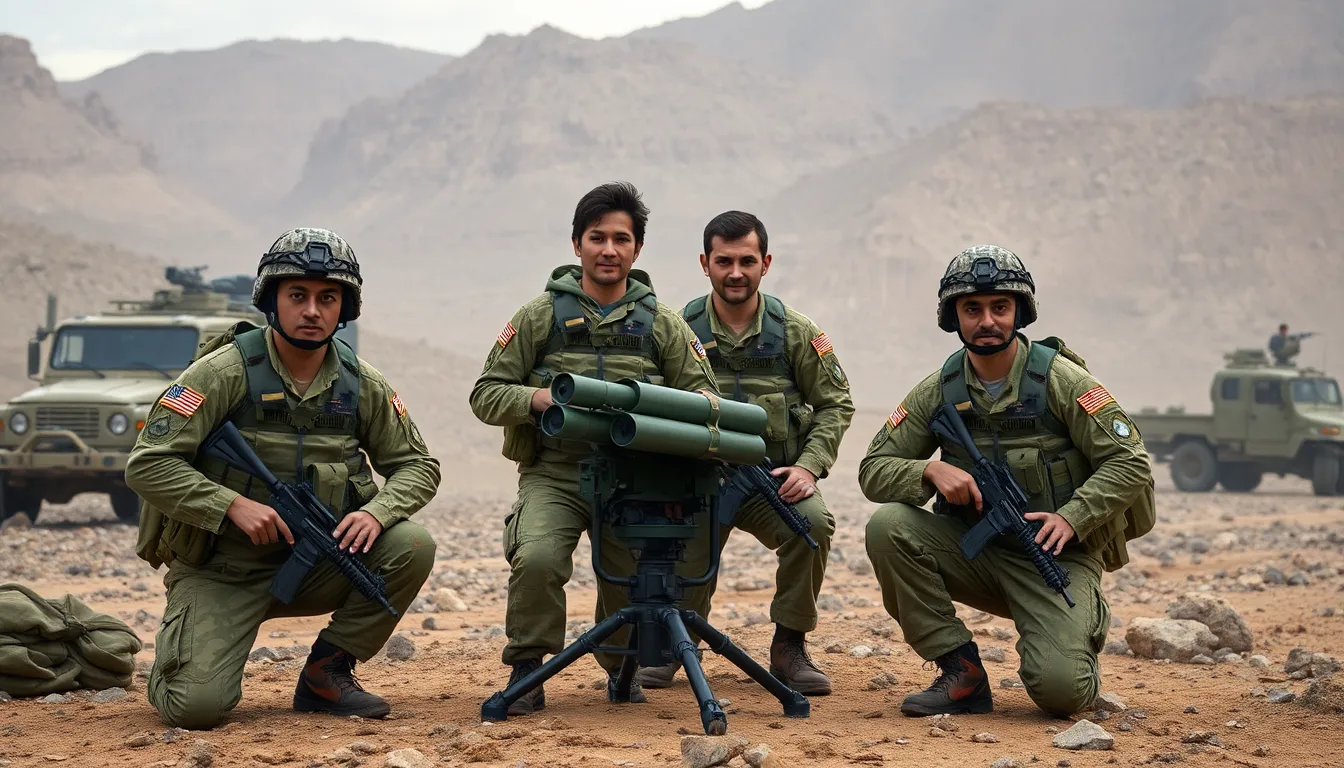In the vibrant world of role-playing games (RPGs), weapons are more than just tools for combat; they’re extensions of a player’s personality and style. Picture this: a wizard wielding a flaming staff, or a rogue sneaking through shadows with a dagger that glimmers like a disco ball. RPG weapons come in all shapes and sizes, each with unique abilities that can turn the tide of battle or make a character feel like a total badass.
Table of Contents
ToggleOverview of RPG Weapons
RPG weapons play a crucial role in defining a character’s abilities and their journey within the game. Each weapon, whether it’s a sword, bow, or magic staff, often comes with unique attributes and effects that can significantly impact combat outcomes and strategies.
Players often choose weapons that align with their character’s class and playstyle. A warrior, for example, may wield a heavy axe that deals tremendous physical damage, while a mage might opt for a wand that amplifies spellcasting abilities.
Various types of RPG weapons exist, including melee, ranged, and magical varieties. Melee weapons require close combat, while ranged weapons allow characters to attack from a distance, providing tactical advantages. Magical weapons introduce additional layers of complexity, granting users special powers or enhancements.
Weapons can also be customized or upgraded, enhancing their performance or altering their abilities. Through quests, players often find rare materials that can forge new weapons or improve existing ones.
Furthermore, some RPGs feature weapon proficiency systems that determine how effectively characters can use specific weapons. Mastery over a weapon might unlock special attacks or combos, allowing for greater character development and combat effectiveness.
Players frequently experiment with different combinations of weapons and abilities, influencing their gameplay experience. This diverse weaponry system adds depth to RPGs, offering countless opportunities for players to explore and express their unique styles.
Types of RPG Weapons

RPG weapons come in diverse forms, each enhancing gameplay and character uniqueness. The main categories include portable and vehicle-mounted RPGs.
Portable RPGs
Portable RPGs refer to handheld weapons designed for regular use in battle. Examples include grenade launchers, rocket launchers, and shoulder-fired missiles. Players appreciate these weapons for their mobility and versatility. Each portable RPG features advantages like rapid deployment and immediate impact. Damage output varies greatly, depending on the type and ammunition used. For instance, a grenade launcher may provide area damage, while a rocket launcher delivers high single-target damage. Players often equip portable RPGs for quick maneuvering and tactical advantages in different combat scenarios.
Vehicle-Mounted RPGs
Vehicle-mounted RPGs are larger systems integrated into combat vehicles. These include systems like missile pods and anti-tank guided missiles. Higher durability defines these weapons, often capable of dealing heavier damage and engaging at longer ranges. Players recognize the strategic advantage offered by vehicle-mounted RPGs, enhancing firepower during large-scale battles. Different vehicles support various RPG types, affecting gameplay strategies. In many cases, coordination with allied vehicles enhances overall effectiveness in combat situations. Overall, vehicle-mounted RPGs provide a formidable presence on the battlefield, essential for dominating enemies.
Functionality of RPG Weapons
RPG weapons serve essential roles in combat scenarios, showcasing unique propulsion mechanisms and diverse warhead types.
Propulsion Mechanism
Propulsion mechanisms define how RPG weapons launch projectiles. Commonly, they utilize rocket technology, allowing for rapid acceleration toward targets. Some models may employ jet propulsion systems, ensuring stability during flight. This method contributes to increased accuracy, even at longer ranges. Players often favor weapons with reliable propulsion due to their effectiveness in diverse combat situations. Such mechanisms grant RPG weapons the capability to strike distant foes while minimizing exposure to counter-attacks.
Warhead Types
Warhead types significantly impact weapon effectiveness and tactical use. Many RPGs incorporate high-explosive warheads, dealing substantial damage to enemy forces and infrastructure. Others may feature shaped charges, optimizing penetration against armored targets. Specialized warheads like incendiary or cluster munitions further diversify tactical options. Choices in warhead types influence a player’s strategy during gameplay, creating opportunities for both destruction and tactical maneuvering. Players often select warheads based on the targets they face, adapting their approach to maximize damage output while maintaining a strategic advantage.
Historical Context
Historically, weapons in RPGs reflect cultural influences and technological advancements, evolving throughout game design. These weapons have roots in ancient weaponry, where melee arms defined combat dynamics.
Early Development
Early RPGs drew inspiration from tabletop games. Mechanical dice played roles in determining outcomes during battles. Weapons like swords and bows emerged as iconic symbols, representing character prowess. Various game systems introduced rules governing weapon effectiveness. Players recognized the importance of weapon choices in shaping narratives and strategies.
Modern Usage
Modern RPGs showcase a blend of tradition and innovation. Developers integrate complex systems for weapon customization and abilities. Variety exists in weapon types, from melee tools to high-tech firearms. Players experience nuanced gameplay through unique mechanics, such as skill trees and proficiency levels. Co-op play often emphasizes teamwork where weapon synergy can turn the tide in battles. RPG weapons now symbolize not just physical tools but also storytelling elements deeply embedded in the gaming experience.
Strategic Importance
RPG weapons play a pivotal role in shaping gameplay strategies. Each weapon type—melee, ranged, or magical—equips players with unique advantages tailored to their character’s abilities. For instance, a warrior wielding a sword excels in close combat, capitalizing on its high damage output, while a mage using a magic staff may focus on area damage or crowd control.
Selecting the right weapon impacts combat outcomes. Players often align weapon choices with character classes. A rogue might choose a dagger for quick, stealthy attacks, enhancing agility during encounters. In contrast, archers benefit from long-range weapons, maximizing their effectiveness while keeping enemies at bay.
Customization adds depth to RPG weapon systems. Upgrading weapons through quests for rare materials enhances performance, allowing characters to adapt to various challenges. Each upgrade can introduce new abilities or improve existing ones, making the weapon’s strategic deployment even more critical.
Weapon proficiency systems further elevate gameplay dynamics. Mastering specific weapons unlocks unique attacks and combos, creating a tailored experience that aligns with a player’s style. The ability to execute powerful moves can shift battle momentum and decisively impact group strategy.
Vehicle-mounted RPGs introduce additional strategic layers. Larger systems like missile pods offer higher durability and damage potential, ideal for orchestrating large-scale battles. Coordinating vehicle-mounted attacks with portable weapons can overwhelm opponents, necessitating teamwork for success.
Understanding the historical context of RPG weapons enriches their strategic importance. Roots in ancient weaponry reflect cultural influences, evolving alongside gaming technology. Modern innovations allow diverse gameplay experiences, with weapons becoming integral storytelling elements.
RPG weapons are more than just tools for combat; they embody a player’s identity and strategic choices. Each weapon type offers distinct advantages that cater to various playstyles, enriching the overall gaming experience. The blend of historical influences and modern innovations in weapon design allows players to engage deeply with their characters and the narratives they unfold.
As players explore customization options and weapon proficiency systems, they find countless ways to enhance their gameplay. This dynamic interplay between weaponry and character development ensures that RPGs remain engaging and immersive, inviting players to craft their unique journeys through the worlds they inhabit.




